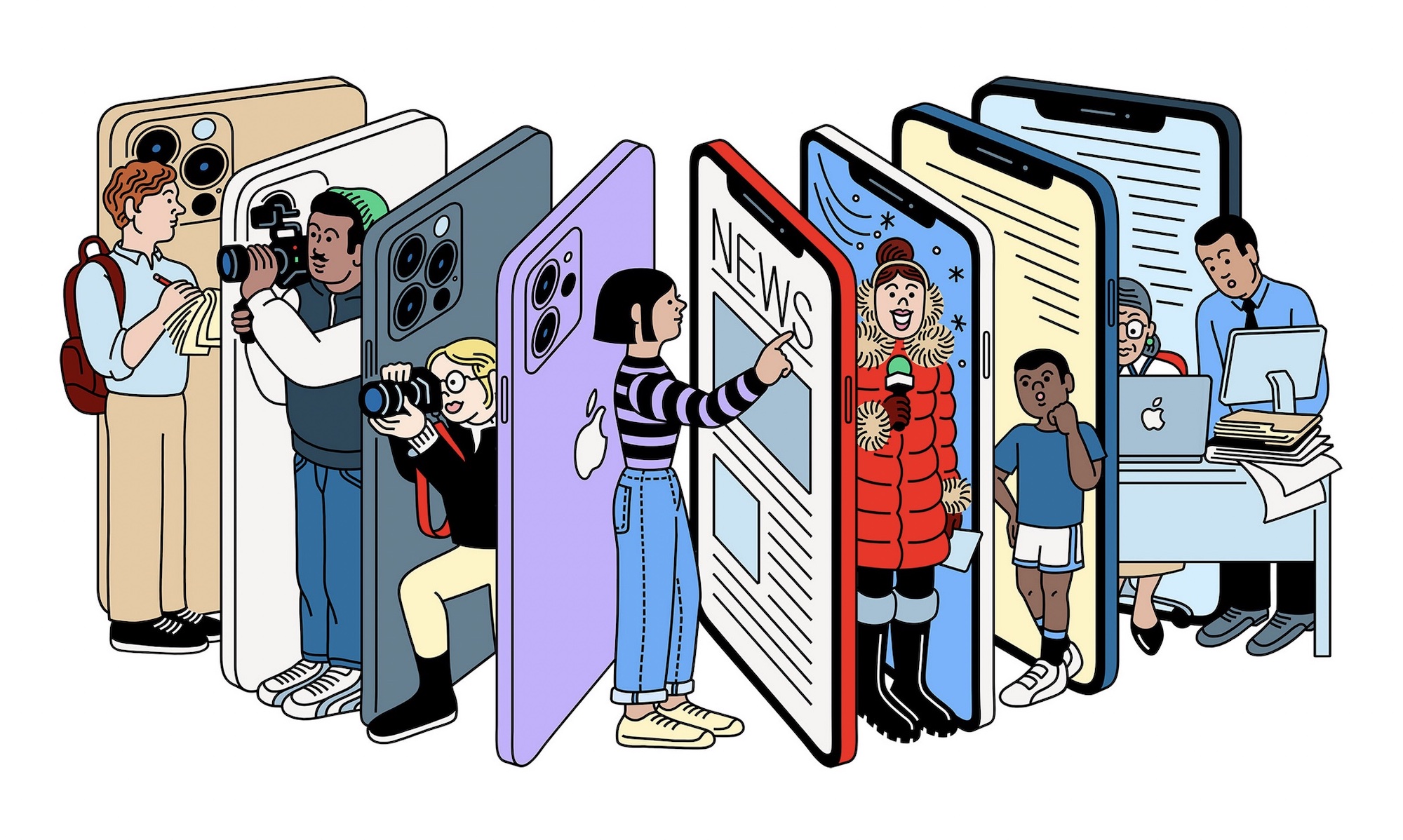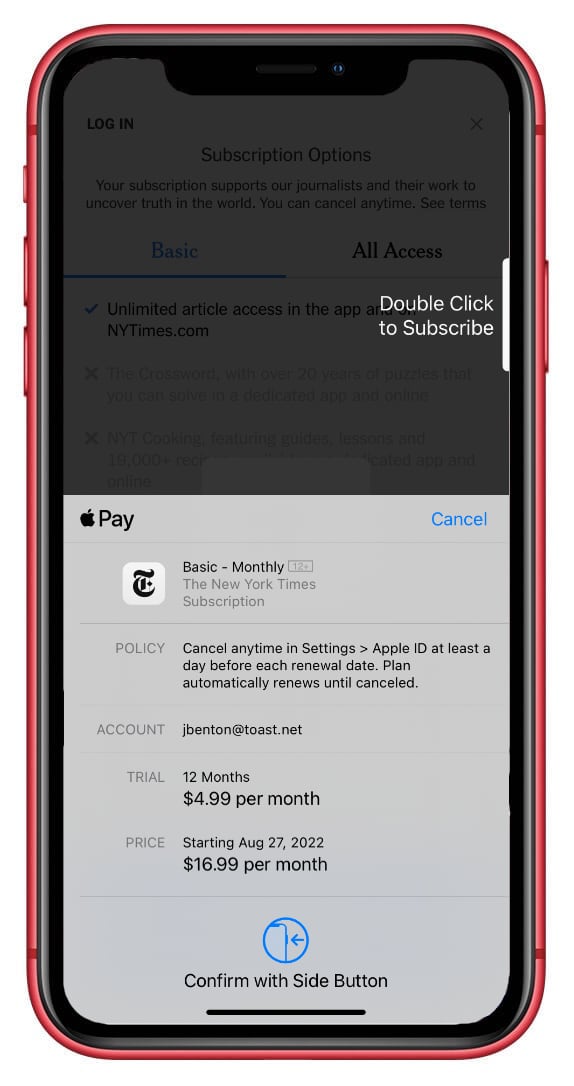
Yesterday brought a second bump. Apple announced a set of changes to its App Store policies as part of a negotiated settlement of a class-action suit brought by developers. (Most important is probably giving developers more leeway to let customers know they can pay outside Apple’s in-app payment system.) But it also announced a new program aimed just at news publishers:
Apple today introduced the News Partner Program, a new slate of initiatives to expand Apple’s work with and support for journalism. The News Partner Program aims to ensure Apple News customers maintain access to trusted news and information from many of the world’s top publishers, while supporting publishers’ financial stability and advancing efforts to further media literacy and diversity in news coverage and newsrooms.The News Partner Program is designed for subscription news publications that provide their content to Apple News in Apple News Format (ANF). ANF enables an exceptional reading experience on Apple News and unlocks the full benefit of the platform for publishers, and empowers publishers to create brand-forward stories, immersive issues, and audio stories, with designs that scale seamlessly across Apple devices. ANF also supports advertising, and publishers keep 100 percent of the revenue from advertising they sell within Apple News.
To support publishers who optimize more of their content in ANF, Apple News is offering a commission rate of 15 percent on qualifying in-app purchase subscriptions from day one.
In other words, if you commit to publishing “a robust Apple News channel,” you can now get access to that lower 15% revenue share. (There are two ways to publish to Apple News. One is to use Apple’s special formatting standard that publishes the full text of stories in the app and allows all sorts of design tweaks. The other is to drop it an RSS feed. To be appropriately “robust” here, you’ll need to be using the first way.)
So, to recap, these are the revenue share options currently available for a news publisher:
The careful reader will note that the small-publisher deal and News Partner deal are identical in terms of its benefits. Only the eligibility rules are different: sales under $1 million for the former, being in Apple News for the latter. So, in practice, the News Partner Program only matters for publishers who already make more than $1 million in annual App Store sales.
Which is a lot for a news publisher! Remember, the vast majority of news consumption on phones doesn’t happen inside publisher news apps, which are still an acquired taste reserved for a publisher’s super fans. It happens on the web — either in standalone browsers like Safari or Chrome or in social apps like Facebook, Twitter, or WhatsApp.
The one-tap ease of use of subscribing via Apple is excellent, but that 30% share has disincentivized publishers from pushing that option too hard to potential subscribers. To generate $1 million a year in App Store sales, you’d need to sell 10,000 in-app subscriptions at $100/year — and I doubt there are very many news publishers who can do that. Probably the national daily newspapers and some big national magazines.
I’ve never seen any hard data on what share of news subscriptions go through the App Store, but I always knew it was very low. Mike Orren, chief product officer for The Dallas Morning News, says it’s a rounding error for them.
Anecdotally, I’d think it pretty low. It’s probably less than 1% for us.
— Mike Orren (@mikeorren) August 27, 2021
And most of the few publishers who probably do hit that number — think The Washington Post, The Wall Street Journal, The New Yorker, Time — are either already part of the Apple News+ upsell package or already “robust” Apple News publishers. They’ll appreciate the extra bucks, no doubt, but their behavior won’t change.
So who is a big news publisher that generates a lot of money from in-app subscriptions but isn’t currently in Apple News? There’s one answer that keeps coming to mind.

Last year, The New York Times pulled its content from Apple News:
The Times is one of the first media organizations to pull out of Apple News. The Times, which has made adding new subscribers a key business goal, said Apple had given it little in the way of direct relationships with readers and little control over the business. It said it hoped to instead drive readers directly to its own website and mobile app so that it could “fund quality journalism.”“Core to a healthy model between The Times and the platforms is a direct path for sending those readers back into our environments, where we control the presentation of our report, the relationships with our readers and the nature of our business rules,” Meredith Kopit Levien, chief operating officer, wrote in a memo to employees. “Our relationship with Apple News does not fit within these parameters.”
I totally believe that line of reasoning; owning the customer relationship is critical to a subscription business. But that said…money is also nice.
Let’s imagine — and to be clear, this is some real back-of-the-envelope stuff here — that 2% of Times subscribers pay via Apple. The going rate for an annual sub in the Times iPhone app right now is $129.99 a year. As of June 30, the Times had 5.334 million digital news subscriptions. That would mean something like 106,000 people are currently paying through Apple.
Let’s say half of those are in their first year of subscribing — meaning the Times is currently paying Apple 30% of the revenue they produce. That would mean the Times is paying Apple more than $3 million a year out of its subscription revenues. Joining the News Partner Program would slice $1 million off of that — in exchange for rejoining Apple News.
Now, The New York Times doesn’t even get out of bed in the morning for $1 million. If they think Apple News is a bad strategic fit (and I believe they have good reason to), $1 million isn’t going to be tempting enough to change their mind.
But…cutting new-sub rates in half could mean some existing publishers see less of a reason to pull out of Apple News. Or, more importantly, it could mean that publishers get more comfortable directing more of its customers into Apple. It is, after all, a really smooth and easy way to subscribe — a lot easier than creating an account, typing your credit card number and address on a phone screen, checking for a confirmation email, et cetera, et cetera.
As Mike put it, one reason so few news subscriptions go through Apple is that publishers spend a surprising amount of energy trying to convince customers not to.
Although, it would be higher under better terms. We go through a lot of gymnastics to try to avoid selling through App Store. I assume others are similar.
— Mike Orren (@mikeorren) August 27, 2021
Publishers are very hesitant to pay 30% of their sales to a middleman. But 15%…that’s within shouting distance of an acceptable finder’s fee/processing charge in many minds. We’ll see if any of those minds get changed.